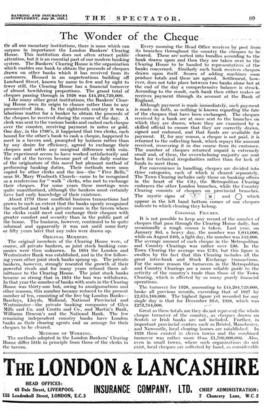The Wonder of the Cheque OF all our monetary institutions,
there is none which can surpass in importance the London Bankers' Clearing House. This institution does not often attract public attention, but it is an essential part of our modern banking system. The Bankers' Clearing House is the organization .which enables one bank to obtain the proceeds of cheques &awn on other banks which it has received from its customers. Housed in an unpretentious building off Lombard Street, known by name to few and by sight to fewer still, the Clearing House has a financial turnover of almost bewildering proportions. The grand total of cheques passing through in 1928- was £44,204,729,000.
Like many other great institutions, the Bankers' Clear- ing House owes its origin to chance rather than to any preconceived idea. In the eighteenth century it was a laborious 'matter for a banker to obtain the proceeds of the cheques lie received during the course of the day. A clerk was sent to the various banks and cashed each cheque over the counter, receiving payment in notes or gold. One day, in the 1760's, it happened that two clerks, each bound for the other's bank to cash a cheque, happened to meet in a tavern and, prompted by laziness rather than by any desire for efficiency, agreed to exchange their cheques and settle any marginal difference with coin. The experiment seems to have worked satisfactorily and the call at the tavern became part of the daily routine of the originators of this novel but pleasant method of performing banking duties. Their methods were soon copied by other clerks and the inn—the " Five Bells," near St. Mary Woolnoth Church—came to be recognized as a rendezvous for " walk " clerks, who met to exchange their cheques. For some years these meetings were quite unauthorized, although the bankers must certainly have had early knowledge of their existence.
About 1770 these unofficial business transactions had grown to such an extent that the banks openly recognized the method and took a private room in the tavern where the clerks could meet and exchange their cheques with greater comfort and security than in the public part of the house. The business, however, continued to be quite informal and apparently it was not until some forty or fifty years later that any rules were drawn up.
















































 Previous page
Previous page